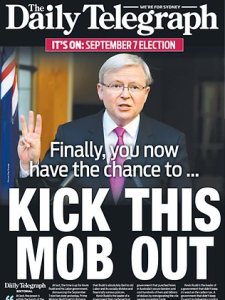Murdoch’s latest play: the erosion of the fourth estate in Australia?
 In the lead-up to the Australian federal election (it’s being held on September 7, if you missed the news) I expected some underhanded tactics, spin and impartial reporting. I just didn’t expect it on the front of one of Australia’s leading daily newspapers.
In the lead-up to the Australian federal election (it’s being held on September 7, if you missed the news) I expected some underhanded tactics, spin and impartial reporting. I just didn’t expect it on the front of one of Australia’s leading daily newspapers.
In case you missed it, there’s been some controversy this week about the publishing of an editorial headlined, “Finally you have the chance to… KICK THIS MOB OUT” accompanied by a photo of our reigning Prime Minister, Kevin Rudd, covering the entire front page of Sydney’s Daily Telegraph on Monday.
The opinion piece (see that word “editorial” under the Daily Telegraph’s by-line?) was a one-sided argument from a Rupert Murdoch-owned newspaper which urged voters “consign Rudd to the bin of history”. [I'm not going to go into the contents of the piece, it's not relevant in this forum but you can read the article here if you're so inclined].
Rupert Murdoch’s empire controls 70% of Australia’s print media and is clearly using its influence to weigh-in on the political battle that lies ahead. I’m just thankful it’s going to be a short one.
What I’m interested in is not the politics of the election but the supposedly bi-partisan role of the media in Australia.
Traditionally the media is seen as the fourth estate (and, more recently, social media has been touted as the fifth estate) – its role is as a guardian of free speech, a watchdog of the political arena and presenter of unbiased (or at least balanced) observations on the latest events of the country, i.e. news.
Yes, news.
Naturally opinion has a role in the news and its presentation and influence on the people of a country. In my (humble, non-multi-billionaire) opinion, the role of the media is, in Australia, “to keep those bastards honest” and the role of the front page of any daily is to present the news; not calls to action to oust the government.
While I understand that the utterly biased media ownership in Australia – three owners: News Corp Australia (formerly News Limited), Fairfax Media and APN News and Media, hold approximately 98% of the sector, and two of these owners, News Corp and Fairfax, together hold about 88% of the print media assets in the country – does give way to impartial reporting, is it too much to ask that we keep politicking off the front page?
On Monday, displaying the front page poster made newsagents looked like propagandists.
We live in a country where the media has a board of influence and shareholders to answer to. We live in a country where one of the largest media companies, Fairfax Media, has Gina Rinehart, the country’s wealthiest person as its majority shareholder.
Imbalanced media ownership in Australia is creating such a bias in reporting that there can no longer be democracy in the media. The erosion of the fourth estate has created a media landscape so skewed by influence that it can no longer be trusted.
I’m not silly, I expect the impartiality, just not on the front page in such a brazen manner. I expected the Australian media to preserve some dignity and honour in their roles as the last bastion of political transparency and accountability.
Clearly I expected too much.
 Obviously I am a believer in blogging as a marketing tool.
Obviously I am a believer in blogging as a marketing tool.